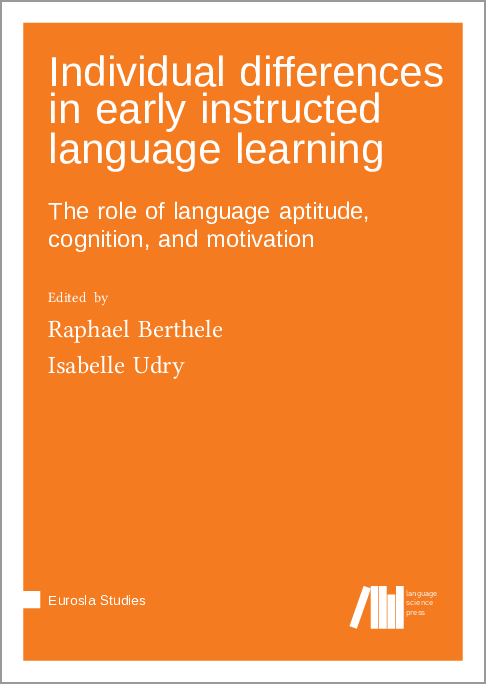We log anonymous usage statistics. Please read the privacy information for details.
Individual differences in early instructed language learning: The role of language aptitude, cognition, and motivation
Synopsis
Variability in predispositions for language learning has attracted scholarly curiosity for over 100 years. Despite major changes in theoretical explanations and foreign/second language teaching paradigms, some patterns of associations between predispositions and learning outcomes seem timelessly robust. This book discusses evidence from a research project investigating individual differences in a wide variety of domains, ranging from language aptitude over general cognitive abilities to motivational and other affective and social constructs. The focus lies on young learners aged 10 to 12, a less frequently investigated age in aptitude research. The data stem from two samples of multilingual learners in German-speaking Switzerland. The target languages are French and English. The chapters of the book offer two complementary perspectives on the topic: On the one hand, cross-sectional investigations of the underlying structure of these individual differences and their association with the target languages are discussed. Drawing on factor analytical and multivariable analyses, the different components are scrutinized with respect to their mutual dependence and their relative impact on target language skills. The analyses also take into account contextual factors such as the learners’ family background and differences across the two contexts investigated. On the other hand, the potential to predict learner’s skills in the target language over time based on the many different indicators is investigated using machine learning algorithms. The results provide new insights into the stability of the individual dispositions, on the impact of contextual variables, and on empirically robust dimensions within the array of variables tested.
Chapters
-
Introduction to the volume
-
Language Aptitude at Primary School (LAPS): Theoretical framework of the project
-
Language Aptitude at Primary School (LAPS): Research design
-
The smart, the motivated and the self-confidentThe role of language aptitude, cognition, and affective variables in early instructed foreign language learning
-
Predicting L2 achievementResults from a test battery measuring language aptitude, general learning ability, and affective factors
-
Dispositions for language learning and social differences
-
Creative thinking as an individual difference in task-based language teaching
-
The closer the better? Investigating L2 motivation of young learners in different contexts
-
The dynamics of young learners’ L2 motivation: A longitudinal perspective
-
Language aptitude in German as a school language and English as a foreign language in primary school
-
The stability of language aptitudeInsights from a longitudinal study on young learners’ language analytic abilities
-
Summing upIndividual differences in primary school foreign language learning
Reviews
-
Sprachen lernen ist kein Kinderspiel
by Patrick Imhasly
published January 29, 2022
Newspaper article for the general public in "NZZ am Sonntag"




